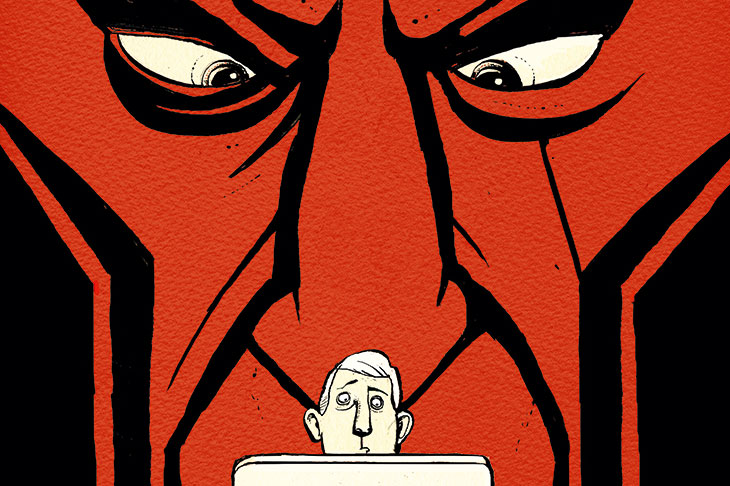Many of you will be waiting, with much excitement, for the Great Lammy Firewall, which will be introduced by our new Labour government just as soon as they’ve nationalised the internet. Free broadband for everyone, except for those reactionaries who contravene one of 756 stipulations written in the inevitable community code of conduct agreements (i.e. most of the people who pay for this stuff through their taxes). That’s me offline, then — and, after a while, probably you too. Imaginary hate crimes will see you sent to the Lammy Sin Bin or, if they’re considered serious enough, the thought police will be round with their black plastic bags and BBC camera crew.
You think I’m joking? I am not joking. A Labour government in charge of the internet: people devoid of a sense of humour (humour is bourgeois, of course, according to Marcuse) or a sense of perspective, and driven by endlessly self-flagellating white liberal neurosis plus a raft of identity politics balls which will stop you doubting the brilliance of anyone with that magical thing, protected characteristics.
‘It will be just like China!’ I’ve heard perfectly decent libertarians lament, but they forget that for McDonnell and co this comparison is deeply pleasing. Mao may have murdered 30 million of his own people, but at least he was a Socialist who ran a tight ship — and John still carries his idiotic Little Red Book around with him. A book which, if memory serves me right, is a bit short on jokes.
I don’t know for sure that Lammy will be put in charge of the firewall, of the policing of us online, but it will surely be some doctrinaire halfwit with the IQ of a bowl of Khmer labour camp rice porridge. Rebecca Wrong Daily, maybe, or that -Pidcock woman. The wonder of the internet, its beautiful empowerment, its breadth and majesty, soon to be corralled by people with the imagination of a bag of kale — kale infused with right-on spite.
By controlling the internet, Lammy and co will also know everything about us, every-thing we say online, everything we’ve done. At the moment it is commendably difficult for the government to poke about in our online affairs, a labyrinthine procedure because there are hundreds of companies through which they have to delve. Not any more — they’re the sole bosses.
And what of the job losses? A friend of mine, Mike Odysseas, runs a small company offering bespoke broadband services to businesses. He employs about 35 people. Once broadband is nationalised, pretty much all those jobs will be gone. Jobs in Middlesbrough, by the way, a town which needs those jobs. Needs jobs requiring talent, not just cold-calling and door-to-door sales, which is what the Job Centre offers. Tens of thousands of jobs nationally are threatened by Corbyn’s magnanimous broadband proposals, but never mind. Many are in poor areas, such as Teesside, and nobody gives a monkeys. Poor Teesside: cut adrift by the Thatcherite Tories, ignored by Corbyn et al.
But can the Labour party win? It is a fascinating election. The Tories are currently wrapped in the narcoleptic balm of opinion polls which suggest that they are anywhere up to 18 points ahead of Labour and thus en route to a comfortable majority. And yet these days the polls are wrong, always wrong. It is true that in the past they have also been wrong, especially in 1992, when they gave Neil Kinnock sufficient grounds for hope that he was able to bawl, hideously, ‘aaaawwwwright’ at euphoric comrades shortly before he got well and truly stuffed again. And they were wrong in 1970. Both times, then, overestimating the Labour vote, and both times heralding the advent of a fairly appalling prime minister.
But they are more wrong these days: wildly underestimating the Conservative vote in 2015, wildly underestimating the Leave vote in the 2016 referendum (and probably still doing so today), and wildly underestimating the Labour vote in 2017. Many explanations have been put forward by the companies for this ineptitude: is it shy Tories? Is it some structural problem with our samples? Is it the volatility of the electorate, its lateness on deciding who to vote for? No, in general, it is none of those things — although there is a glimmer of truth in the last suggestion. The failure on every occasion has been in gauging how the lower classes will vote, and repeatedly getting it wrong — even in 1992. And especially that proportion of the lower-class vote known as the ‘don’t-knows’.
Around half don’t-knows are in the lowest social classifications and in one poll I saw these were the third biggest tranche of voters, registering 16 per cent. That’s a lot of voters. The (rather convenient) thesis has it that in 2015 the don’t-knows went, in the end, for the Tories, in 2016 for Leave, and in 2017 for Labour. So if this is true, how do we work out which way they are going to vote this time around? And are they telling us they don’t know because they really don’t want to tell us which way they are voting, or because they genuinely haven’t made up their minds?
If it is the latter then the success or otherwise of the respective campaigns will be the deciding issue. If the former, then one assumes the votes may stack up beside the Conservative candidates. My worry, though, is that this is a far more geographically split election than ever before — and that the healthy Conservative lead is largely a case of the party piling up votes in areas where it doesn’t really need them, such as the south-east of England (London excluded).
Still, I am less pessimistic than I was three weeks ago. Just about. I mean, the gas is still on in the oven, but I have gingerly taken my head out.
Got something to add? Join the discussion and comment below.
Get 10 issues for just $10
Subscribe to The Spectator Australia today for the next 10 magazine issues, plus full online access, for just $10.
You might disagree with half of it, but you’ll enjoy reading all of it. Try your first month for free, then just $2 a week for the remainder of your first year.















Comments
Don't miss out
Join the conversation with other Spectator Australia readers. Subscribe to leave a comment.
SUBSCRIBEAlready a subscriber? Log in